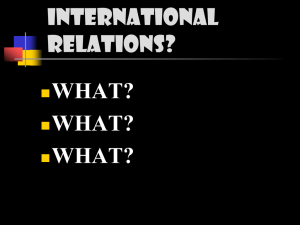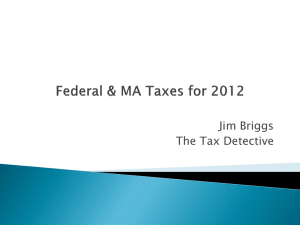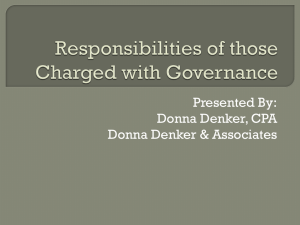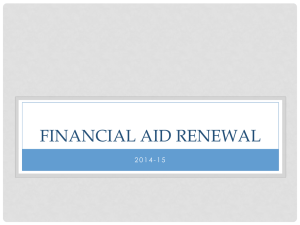IRS Update (MACE Oct 16 2014)
advertisement
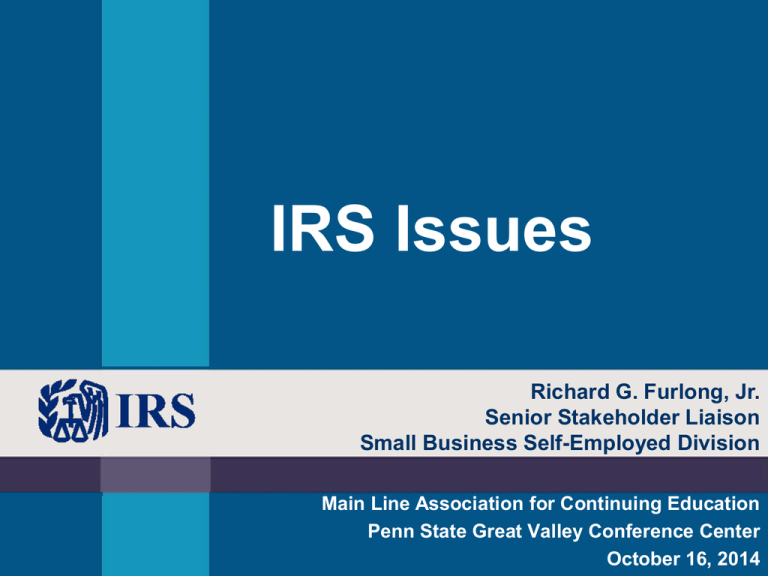
IRS Issues Richard G. Furlong, Jr. Senior Stakeholder Liaison Small Business Self-Employed Division Main Line Association for Continuing Education Penn State Great Valley Conference Center October 16, 2014 Issue 1: Taxpayer Bill of Rights Ten broad categories: 1. Right to Be Informed 2. Right to Quality Service 3. Right to Pay No More than the Correct Amount of Tax 4. Right to Challenge the IRS’s Position and Be Heard 5. Right to Appeal a Decision in an Independent Forum 2 Taxpayer Bill of Rights (cont.) Ten broad categories (cont.) 6. Right to Finality 7. Right to Privacy 8. Right to Confidentiality 9. Right to Retain Representation 10. Right to a Fair and Just Tax System 3 Issue 2: The Collection Process • Begins when a return is filed without paying the debt in full • Paying your taxes – Options for paying in full – Options if you can’t pay in full now • Installment agreement • Offer in compromise − If you need more time to pay 4 Collection Appeals Options • Taxpayers can appeal most collection actions. • Main options: − Collection Due Process − Collection Appeals Program 5 The Collection Process • Penalties − Failure to file − Failure to pay • Interest • Abatement 6 Issue 3: Online Payment Agreement Application • Streamlined • Less financial info required • Maximum time to pay 72 months • Immediate approval notification • Eligibility (all required returns filed) – Individuals less than or equal to $50,000 tax and penalties – Businesses less tax and penalties than or equal to $25,000 7 Online Payment Agreement Application When applying online, be ready to provide: authentication information, tax return data and basic financial information. 8 Online Payment Agreement Application • Application fees (as of Jan. 1, 2014) – $120, standard agreement – $52, direct debit agreement – $43, applicant meets low income guidelines • Online system available – Monday – Friday, 6 a.m. – 12:30 a.m. ET – Saturday, 6 a.m. -10 p.m. ET – Sunday, 6 p.m. - midnight ET 9 Issue 4: Offer in Compromise • Five basic requirements: − Filed all returns − Made all required estimated taxes payments − Current with federal tax deposits − Can’t pay full amount − Not in bankruptcy 10 Offer in Compromise • IRS may accept an offer on three grounds: − Doubt as to liability − Doubt as to collectability − Effective tax administration 11 OIC Pre-Qualifier Tool The OIC Pre-Qualifier tool helps applicant s confirm eligibility and prepare preliminary proposals. 12 Offer in Compromise Components • The completed offer package must include all of the following items: – Form 433A or 433B – Form 656 for each taxpayer – $186 non-refundable fee – Non-refundable payment 13 Issue 5: Notice of Federal Tax Liens • Claim against current and future rights to property • Once lien exists, controlled by IRC §6322 – Date of origin becomes assessment date – Exists until liability is satisfied or becomes unenforceable by lapse of time • IRS not required to file Notice of Federal Tax Lien for tax lien to attach 14 Notice of Federal Tax Liens • Filing criteria: Generally, the IRS will not file a Notice of Federal Tax Lien if the unpaid balance of assessment is less than $10,000. • Payoff amount: Call 800-913-6050 • Appeal: Within 5 business days of filing. IRS will send a Notice of Your Right to a Collection Due Process Hearing. 15 NFTL - IRS Actions • Release of lien – IRS has cleared both the lien for the debt and the public NFTL – IRS Publication 1450 • Withdraw of lien – Removes NFTL from public records – Does not mean federal tax lien is released or taxpayer no longer liable for amount 16 NFTL - IRS Actions (cont.) • Discharge of lien – Removes a lien from specific property – IRS Publication 783 • Subordination of lien – Allows a creditor to move ahead of the government’s priority position – IRS Publication 784 17 Issue 6: Audit Reconsideration Process used by IRS to help taxpayers when they disagree with the results of an IRS audit of their tax returns, or returns created for them by the IRS because they did not file tax returns as authorized by the Internal Revenue Code 6020(b). 18 Audit Reconsideration Process • Step 1: – Review examination report and attachments; determine which items you feel are incorrect – Gather documentation needed to support your position – Verify supporting documentation is information that has not been presented before; ensure it’s for tax year in question 19 Audit Reconsideration Process • Step 2: – Make photocopies of documents and attach them to your letter explaining your request for reconsideration – If available, attach copy of examination report, Form 4549, along with new documentation supporting your position – Include a daytime and evening telephone number and the best time for us to call you 20 Issue 7: Information Document Requests • New guidelines to LB&I examiners and specialists when issuing an IDR during the information gathering phase on an examination • LB&I Directive of Information Document Requests (LB&I-04-0214-004) – Requirements for issuing IDRs – Three-step IDR enforcement process 21 Issue 7: Information Document Requests • LB&I requirements for issuing IDRs – Discuss the issue with taxpayers – How / why the information is necessary – One IDR for each issue – Customize IDR to fit taxpayer or industry – Provide draft and discuss IDR with T/P (generally, completed w/n 10 bus days) – Determine reasonable response date 22 Issue 7: Information Document Requests • LB&I IDR Enforcement Process, three graduated steps: 1. Delinquency notice 2. Pre-summons letter 3. Summons 23 Issue 8: IRS Letters to Tax Professionals • November 2013, IRS began its fifth year of a hands-on effort to improve the accuracy and quality of filed tax returns and heighten awareness of preparer responsibilities • Contacts are made through letters and visits 24 IRS Letters to Tax Professionals • Letter 5105 – Recommends recipient review all Sch C and preparer due diligence rules, as well as pay special attention to Sch C accuracy • Letter 4810 – Advises recipient that an IRS representative will contact them to schedule an educational visit to review their responsibilities in correctly preparing the Sch C 25 IRS Letters to Tax Professionals • Letter 5271 – Recommends the recipient review all Additional Child Tax Credit (Sch 8812) and preparer due diligence rules • Letter 5272 – Similar to Letter 5271, adding that recipient should pay special attention to ACTC accuracy where dependents have an ITIN 26 IRS Letters to Tax Professionals • Letter 4911 – Notifies recipient that IRS Return Preparer Office (RPO) is aware that they are not in compliance with their federal tax filing and/or payment responsibilities – If matters addressed, no contact required 27 Issue 9: EIC Due Diligence • FY13 improper payments of earned income credit estimated between $13.3B - $15.6B • IRS is combating these errors with – Due diligence requirements – Due diligence compliance audits 28 EIC Due Diligence • Due diligence requirements: − − − − Complete/Submit eligibility checklist Compute the credit Knowledge Recordkeeping 29 EIC Due Diligence • Consequences of not meeting due diligence requirements – Penalties – Suspension/expulsion from IRS e-file – Disciplinary action by IRS OPR – Injunctions 30 Issue 10: Treasury Inspector General For Tax Administration The Treasury Inspector General for Tax Administration (TIGTA) was established in January 1999 in accordance with the Internal Revenue Service Restructuring and Reform Act of 1998 (RRA 98) to provide independent oversight of Internal Revenue Service (IRS) activities. 31 What Should Be Reported to TIGTA • Allegations of violations affecting the integrity of federal tax administration and IRS programs • Allegations of improprieties, false claims and fraud by outside contractors attempting to defraud the IRS by using deceptive methods • Allegations of identity theft where any individual impersonated the IRS or an IRS employee 32 Reporting Complaints to TIGTA • Complete online form − By email: Complaints@tigta.treas.gov − By phone: 800-366-4484 − By fax: 202-927-7018 − By mail: TIGTA Hotline P.O. Box 589 Ben Franklin Station Washington, DC 20044-0589 33 Contact Information Richard Furlong, Jr. 215-861-1551 richard.g.furlong@irs.gov 34

